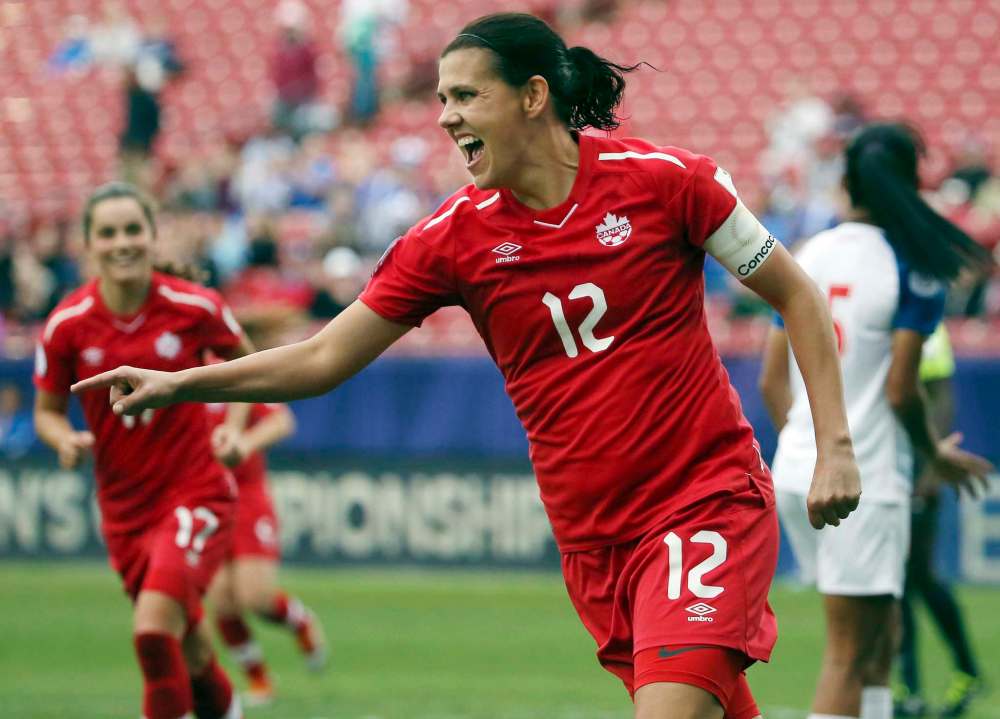Christine Sinclair’s likely last World Cup loaded with meaning for all women
Advertisement
Read this article for free:
or
Already have an account? Log in here »
To continue reading, please subscribe:
Monthly Digital Subscription
$1 per week for 24 weeks*
- Enjoy unlimited reading on winnipegfreepress.com
- Read the E-Edition, our digital replica newspaper
- Access News Break, our award-winning app
- Play interactive puzzles
*Billed as $4.00 plus GST every four weeks. After 24 weeks, price increases to the regular rate of $19.00 plus GST every four weeks. Offer available to new and qualified returning subscribers only. Cancel any time.
Monthly Digital Subscription
$4.75/week*
- Enjoy unlimited reading on winnipegfreepress.com
- Read the E-Edition, our digital replica newspaper
- Access News Break, our award-winning app
- Play interactive puzzles
*Billed as $19 plus GST every four weeks. Cancel any time.
To continue reading, please subscribe:
Add Winnipeg Free Press access to your Brandon Sun subscription for only
$1 for the first 4 weeks*
*$1 will be added to your next bill. After your 4 weeks access is complete your rate will increase by $0.00 a X percent off the regular rate.
Read unlimited articles for free today:
or
Already have an account? Log in here »
Hey there, time traveller!
This article was published 31/05/2019 (2314 days ago), so information in it may no longer be current.
Christine Sinclair says she’s waited her entire career to compete on the squad she’ll captain at the 2019 FIFA Women’s World Cup in France, June 7-July 7.
Two previous instalments of the Canadian national team, don’t forget, won bronze medals at the Olympic Games of 2012 and 2016. But this one, she hopes, will be even more special.
This is likely to be Sinclair’s last World Cup (she’ll turn 36 during the tournament). She has yet to reveal her plans or set a timetable for retirement, but with American Abby Wambach’s all-time goal-scoring record tantalizingly close, and having become the face of soccer in this country, and one of its most recognizable athletes, there is little left for her to accomplish on the pitch.

Already a decorated Olympian and champion at club level, all that’s really missing is World Cup success. And wider, mainstream respect for women’s sports.
Articulate, yet possessing an archetypal Canadian reserve, Sinclair has not fronted a movement for equal pay and treatment in the style of her counterparts in the United States. That said, she was clearly frustrated with former head coach John Herdman’s sudden switch to the men’s team, and last year in a tweet to Canada Soccer she called out the organization for what she felt was deficient promotion of World Cup qualification.
She is also an advocate for a professional women’s soccer setup in Canada, whether in the mould of the fledgling Canadian Premier League or as part of the U.S.-based National Women’s Soccer League. It’s in this sort of activism — as a visionary, leader or even administrator — that one can just see her thriving. Whatever the future of Canadian women’s soccer, Sinclair will almost certainly continue to be its central figure.
In a way, it’s unfortunate that the buildup to women’s sporting events such as the World Cup must include discussion about matters so much bigger than sports. To play sports as a woman is also to push up against a patriarchal system and work towards a day when the game is discussed solely on its sporting merit.
“Since we started out, we haven’t just fought against opponents. We’ve fought against prejudice,” a recent video released by Germany’s national team declares.
“For our first (European) title we were given a tea set.” That was in 1989. Things have changed in 30 years, but not enough. Ada Hegerberg, the reigning Ballon d’Or winner who scored a hat-trick in last month’s Champions League final, has pulled out of the Norway squad because of a dispute with the Norwegian Football Federation. As a result, this World Cup won’t even include the best player in the world.
Still, and with that backdrop that is so much bigger than the sport itself, the World Cup goes on. Germany, after winning Olympic Gold in Rio de Janeiro, will look to remain atop the podium. The United States, featuring some of women’s soccer’s biggest stars, will attempt to retain the trophy. The Netherlands, European champions for the first time in 2017, will lead a new wave of European contenders that will also include England and France, the host nation. South Africa, which recently achieved equal pay with the men’s team, will aspire to become the first African side to contest a major semifinal. And Brazil, led by the great Marta, will try to finally attain international glory.
And there is Canada, ranked fifth in the world and led by a captain who has waited 19 years for this team. Jordyn Huitema, who recently joined Paris Saint-Germain, is just 18 years old and part of an exciting young group that also includes fellow forward Janine Beckie, midfielder Jessie Fleming and defender Kadeisha Buchanan. There are 14 players age 24 or younger on head coach Kenneth Heiner-Moller’s squad. The future is now. And it will be guided by assured veterans Allysha Chapman, Winnipeg’s Desiree Scott and Sinclair.
This is still her team. Very much so. And it’s her World Cup. On the pitch, anyway. Off it, around it and all over the world, it’s everyone’s World Cup.
jerradpeters@gmail.com
Twitter @Jerrad Peters


